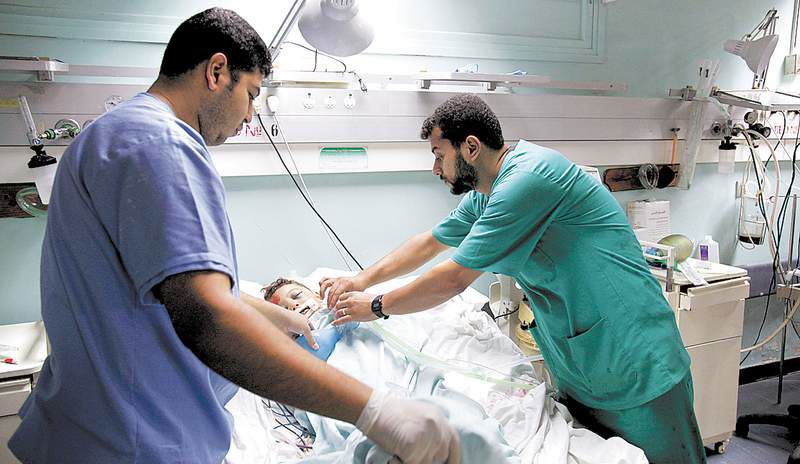Gaza: Locked in despair
Published 5:00 am Wednesday, July 14, 2010

- Momen al-Ghemri, right, a nurse who lives in a refugee camp, treats a boy who fell from the fourth floor of a building at Al-Shifa hospital in Gaza City.
GAZA CITY — The women were bleary-eyed, their voices weak, their hands red and calloused. How could they be expected to cook and clean without water or electricity? What could they do in homes that were dark and hot all day? How could they cope with husbands who had not worked for years and children who were angry and aimless?
Sitting with eight other women at a stress clinic, Jamalat Wadi, 28, tried to listen to the mental health worker. But she could not contain herself. She has eight children, and her unemployed husband spends his days on sedatives.
“Our husbands don’t work, my kids are not in school, I get nervous, I yell at them, I cry, I fight with my husband,” she blurted. “My husband starts fighting with us and then he cries: ‘What am I going to do? What can I do?’”
The Palestinians of Gaza, most of them descended from refugees of the 1948 war that created Israel, have lived through decades of conflict and confrontation. Their scars have accumulated like layers of sedimentary rock, each marking a different crisis — homelessness, occupation, war, dependency.
Today, however, two developments have conspired to turn a difficult life into a new torment: a three-year blockade by Israel and Egypt that has locked them in the small enclave and crushed what there was of a formal local economy; and the bitter rivalry between Palestinian factions, which has undermined identity and purpose, divided families and caused a severe shortage of electricity in the middle of summer.
There are plenty of things to buy in Gaza; goods are brought over the border or smuggled through the tunnels with Egypt. That’s not the problem.
Issue is not hunger
In fact, talk about food, and people here get angry because it implies that their struggle is over subsistence rather than quality of life. The issue is not hunger. It is idleness, uncertainty and despair.
Scores of interviews and hours spent in people’s homes over a dozen consecutive days here produced a portrait of a fractured and despondent society unable to imagine a decent future for itself as it plunges into listless desperation and radicalization.
It seems most unlikely that either a Palestinian state or any kind of Middle East peace can emerge without substantial change here. Gaza, on almost every level, is stuck.
A main road was blocked off and a stage set up for a rally protesting the electricity shortage. Speakers shook nearby windows with the anthems of Hamas, the Islamist party that has held power here for the past three years. Young men carried posters of a man with vampire teeth biting into a bloodied baby.
The vampire was not Benjamin Netanyahu, the Israeli prime minister. It was Salam Fayyad, prime minister of the Palestinian Authority in the West Bank.
As if the Palestinian people did not have enough trouble, they have not one government but two, the Fatah-dominated one in the West Bank city of Ramallah and the Hamas one here. The antagonism between them offers a depth of rivalry and rage that shows no sign of abating.
Its latest victim is electricity for Gaza, part of which is supplied by Israel and paid for by the West Bank government, which is partly reimbursed by Hamas. But the West Bank says that Hamas is not paying enough so it has held off paying Israel, which has halted delivery.
John Ging, who heads the Gaza office of the U.N. Relief and Works Agency for Palestine Refugees, known as UNRWA, says the latest electricity problem “is a sad reflection of the divide on the Palestinian side.”
He added, “They have no credibility in demanding anything from anybody if they show such disregard for the plight of their own people.”
‘If we try to leave, they will shoot us’
The waves were lapping the beach. It was night. Mahmoud Mesalem, 20, and a few of his friends were sitting at a restaurant.
University students or recent graduates, they were raised in a world circumscribed by narrow boundaries drawn hard by politics and geography.
Mesalem pointed at an Israeli ship on the horizon, then made his hand into a gun, pointed it at his head.
“If we try to leave, they will shoot us,” he said.
Israel is never far from people’s minds here. Its ships control the waters, its planes control the skies. Its whims, Gazans feel, control their fate.
And while most here view Israel as the enemy, they want trade ties and to work there.
Economists here say what is most needed now is not more goods coming in, as the easing of the blockade has permitted, but people and exports getting out.
“Our position against the movement of people is unchanged,” said Maj. Gen. Eitan Dangot, the Israeli in charge of policy to Gaza’s civilians. “As to exports, not now. Security is paramount, so that will have to wait.”






